The Magic Bullet - Exercise
You Brain on Running and exercise

Your Brain on Running and Exercise
If ever there was a magic health bullet it would be exercise. Regular exercise has been proven to provide both mental and physical benefits and that’s what I want to discuss this week.
For myself I have, in the last few years, discovered running, or perhaps, in my case, jogging. There is no question in my mind as to the benefits of regular jogging, but I don’t think it needs to be running, it could just as easily be walking, swimming or any aerobic exercise which forces you to breath through you mouth and elevates your heart rate. By keeping a regular regime, I run 6 kilometres every two days usually early in the morning, it gradually becomes a habit and the effort of getting of getting going gets easier and the pain subsides.
The greatest benefit, apart from some physical fitness, is the change in mood. I can vouch for the fact that this is absolutely tangible. My levels of optimism and ability to deal with complex problems is elevated. But still more than this, is has become a kind of meditation, a quiet time with nothing to do except to listen to my breathing and my music.

But still greater than this is it has become a sort of idea factory. Almost without fail, without my prompting it, ideas and solutions to problems seem to leap spontaneously into my mind. Not necessarily in a big way, but small ideas and solutions to that reduce overarching thoughts into simple “next steps”.
Whilst considering writing this blog about the benefits of running I have found that there is a huge amount of research and evidence to support what I feel. I want to share a little of this research with you today, in the hopes that you will also see the benefits of running or walking and adopt the habit.
There is a current trend in the way we consider our bodies and minds as if they were two separate entities. We see the brain as separate from the body. Our minds as an abstract entity, our bodies as the entity that carries our brain around. Many health professionals feel that either it is only the mind that matters, or conversely, it is only the body that needs healing. Without doubt this is wrong, the brain/mind and the body should be viewed as a unified organism. One interlaced with the other.
Damon Young in his book “How to think about exercise”, says that you can’t have the health of one without the health of the other. We tend to see physical and mental exertion as somehow in conflict, not because there is too little time, but because existence seems to be split in two. Exercise is our chance to educate our bodies and our minds, all at once.
Exercise is an effect way to way to improve mental health and to boost your mood.
Physical benefits.
The physical benefits are fairly well known.
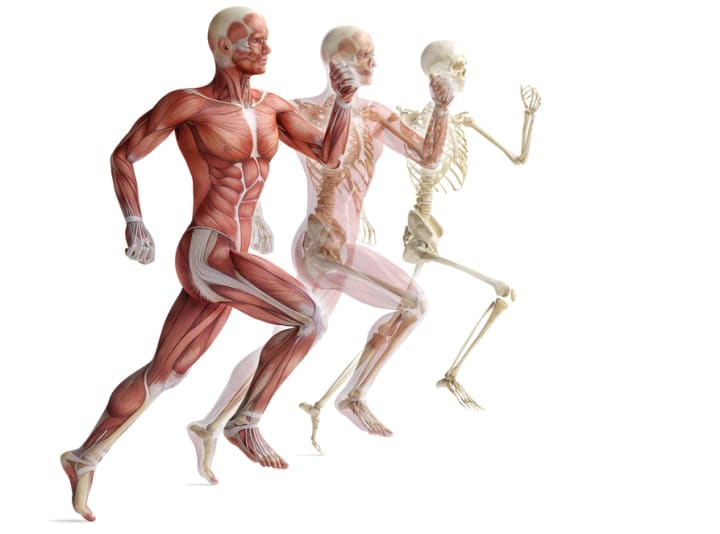
Obviously running builds muscle strength, increases heart rate which strengthens your heart muscles and cardio-vascular health. It pumps blood around your body faster, which helps to “flush through” your veins and reduce the risk of blood clotting.
Respiration and lung capacity and processing are also increased leading to better diaphragm functioning and better processing of air into the bloodstream.
There are studies that also say the regular running can improve knee health too. In a study of 2,637 people, carried out over 8 years they found that people who ran were less likely to suffer knee pain and osteoarthritis. The same study also asserts that not only are muscles strengthened, but also bones are strengthened. It is important to remember not to over train though. Bones become stronger with exercise. I would completely agree with this study, as I have less discomfort or pain since running. I suspect that this study applies to moderate running more that to sprinting or ultra-marathons.
In a further study, researchers found that an average 160-pound man running at 5MPH will burn in the region of 606 calories per hour. Similarly, a 200-pound man also running at 5MPH will burn in the region of 755 calories per hour. If that speed is increased to 8MPH then they will burn 861 and 1074 per hour respectively.
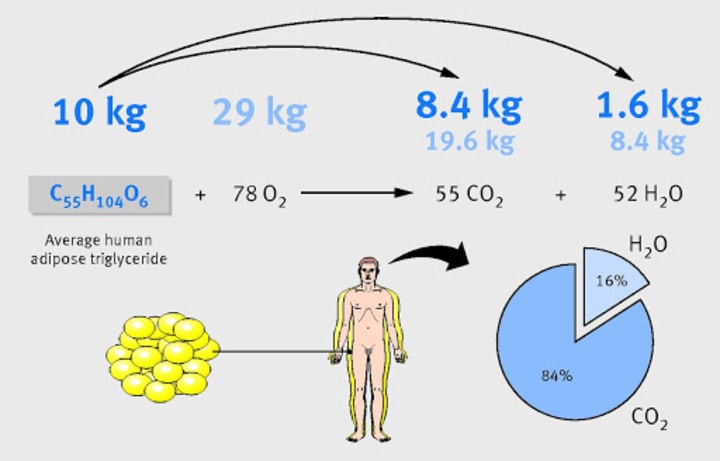
There is an interesting piece of research about where the fat goes that is burnt during exercise. Contrary to popular belief it isn’t just burnt off as energy. It is in fact converted from the Carbon, Hydrogen and Oxygen (C55H104O6 = average fat) to water (H2O) and carbon dioxide CO2. CO2 is expelled through our breathing and the water is probably expelled via urine, perspiration and possibly tears (depending on how hard you’re training. So, for every 10 kg fat you need to inhale 29 kg of oxygen in order to metabolize the fat. This produces 8.4 kg CO2 and 1.6 H2O. So, you literally convert fat into thin air (and a bit of water).
Mental benefits.
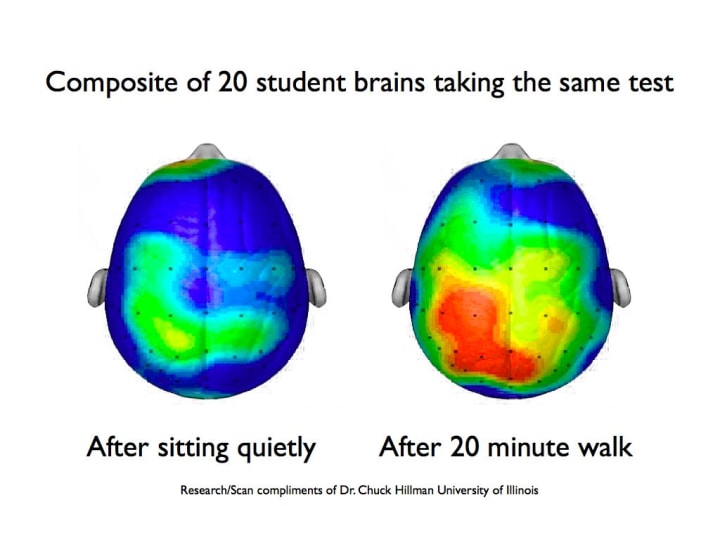
Running or regular exercise has been shown in many studies to improve mental health. We’ve all heard of the so-called “runners high”. This is due to the release of various chemicals including the neurotransmitter norepinephrine which is one of the hormones and neurotransmitters that is known to help moderate the brains response to stress. Also released is serotonin which contributes to our feeling of well-being and happiness, but also has an effect on the modulation of cognition, reward, learning, and memory amongst other things. These combined with other hormones and neurotransmitters boost our ability to deal with mental tension.
Exercise also increases the brains ability to create new brain cells by increasing brain-derived proteins. Thus, improving mental performance.
Let’s not forget that running in the open exposes you to sunshine (not a lot in the UK lately) which allows your body to produce more vitamin D. There is also a direct correlation between vitamin D and its production and lessening depression. As little at 10 minutes per day exposure can help in the production of better levels of vitamin D. It is very easy to trapped in negative thinking cycles, so anything that helps to relieve that must be good.
A study reported in JAMA Psychiatry Journal, physical activity is an effective strategy for reducing levels of depression. Likewise, the Journal of American College Sports Medicine reports similar findings.
Exercise has also been shown to reduce cognitive decline. Whilst it can’t act as a cure for Alzheimer’s, exercise boosts ability to minimise cognitive decline by preventing the decline of the hippocampus which is the brain area intimately involved in the storage and processing of information and memory. This brain region is intimately involved in Alzheimer’s and other forms of dementia. The studies show that the hippocampus decreases in size with mental health and cognitive functions. This would include depression, Bi-polar disorder schizophrenia and dementia. Just 10 minutes of exercise daily has been shown, in the short-term, to have an impact on the hippocampus and, after 12 weeks of regular exercise resulted in long-term impact on the hippocampus.
Due to the chemicals released the mind is induced into a calmer state. A further study showed that regular exercise resulted in more energy during the day and more productivity.
Running (and any exercise) uses some of the adrenaline that is often cited as the cause of anxiety. Reducing anxiety reduces intrusive thoughts which can be the plague of concentration and the ability to focus on the task in hand.
Exercise can also be related to our ability to sleep well (which has a huge effect on our mental well-being). Research sows that exercising 5-6 hours before sleep allows the core body temperature to lower. Sleep raises the core body temperature, so when the body temperature drops back to normal (5-6 hours after exercise), that signals the time to sleep.
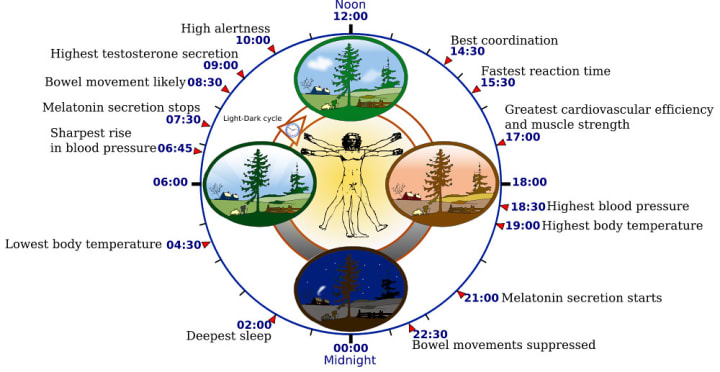
Our circadian rhythms (natural, internal process that regulates the sleep-wake cycle and repeats roughly every 24 hours) are also well served by exercise. Research has shown that midday is probably the best time to exercise. In a study of Park Run, a free and inclusive community running program developed by Paul Stinton-Hewit, 8000 people ran 5 kilometres pe week and 89% reported a positive impact on their happiness, mental health and sense of well-being.
There are massive benefits associated with running and exercise to motivation, self-confidence and personal sense of achievement.
Alex Eagle of the Running Charity said “When you achieve something your internal narrative told you was physically and mentally impossible, it forces you to challenge your perception of self”.
The benefits certainly outweigh the disadvantages as my research shows. But greater than all this, for me is that running has become a form of meditation and relaxation. Just being quietly on my own, listening to my music, listening to my breathing and my feet strike the ground, releases my mind from intrusive thoughts and gets me into a gentle flow state. That sets me up for the day.
I am very lucky, I live within 5 minutes of a beautiful park and in the opposite direction I have the river, both change with the seasons and are a chance to get in amongst the tress, the air, the daylight and my thoughts. It’s a kind of meditation and a very effective idea factory.


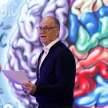




Comments
There are no comments for this story
Be the first to respond and start the conversation.